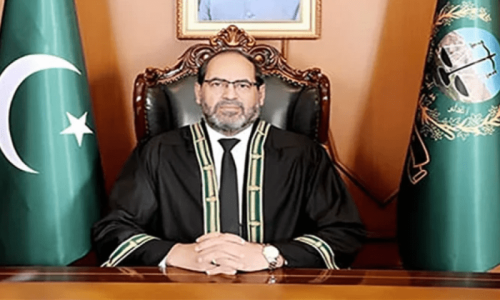LAHORE: Novelist Mohsin Hamid at the opening of the Afkar-e-Taza ThinkFest discussed the language question in Pakistan, truth in the contemporary world, his novels and writing style in a session, called ‘Challenging Truth’, at Alhamra on Saturday. He was in conversation with Dr Waseem Anwar of Kinnaird College.
When asked about his book of essays, Discontent and Other Civilisations, Hamid said it was an outcome of discontent and the things that annoyed a person and took one back to structures that one belonged to – a particular group of people whether Punjabi, Muslims, Pakistani or certain political parties.
About the question of language and writing in English, he said he chose the language because he was more fluent in English than Urdu.
“For many people, language is something that occurs from the journey of life, and in my case, although Urdu was my first language I forgot it and English became my second language and I did not have a first language. I re-learnt Urdu and it became my third language. I don’t have a first language because my mother tongue was forgotten. If I tend to write a book in Urdu, it would be horrific. For me, it’s not that I prefer to write in English, it’s just that the instrument (language) that I learnt to play much better with happened to be English.”
Hamid said in Pakistani universities, many young people were reading in English or learning to read in English. “There is an English language tradition that exists in Pakistan, which is not external. It’s partly because young people realise that English is the language of power. I never had this feeling that English was not a Pakistani language. It’s also a mistake to think that English comes to Pakistan from outside. We do have a degree of ownership over this language.”
On challenging truth, he said when a country or society talked about ‘truth’ and insisted on it, one had no option but to challenge that ‘truth’. “Truth is something that needs to be contested, and in Pakistan also we have to do that,” he added.
When asked about his relationship with his characters, the author said, “When I am writing a character -- man, woman, young or old – I’m trying to be that person. In doing that, you are the actor playing that character and also the playwright. So the character is not a separate thing. Most fiction is about blurring that boundary. When you read fiction you are allowing other people to exist inside you.”
Talking about the anger in his first two novels, Moth Smoke and The Reluctant Fundamentalist, he conceded that in the former, the protagonist was angry and so was he himself at the time of writing the novel, adding he had the same feeling right now. “It’s difficult to be in Pakistan and not be angry, looking around at the enormous talent, history, culture all around and not be angry at what’s going on”.
He also suggested that Moth Smoke was a way of looking at Lahore through his eyes and a partly Americanised eyesight. “Then I wrote The Reluctant Fundamentalist, which is looking at America after 9/11 with eyes that were quite Pakistani. The gaze is slightly different in each. In my third novel, I tried to set myself the task of interrogating what I do. I said I’ll write a novel that does not use the word Pakistan, Islam or doesn’t talk, in any way, about a specific place, but still use Lahore as a template for a universal city.”
Earlier, Dr Yaqoob Bangash opened the ThinkFest, saying it was the first edition of the festival after Covid-19 and that the organisers wanted things to settle down before holding it again. He hoped great ideas were taken forward from the podium to the audiences and beyond the venue.
EU Ambassador to Pakistan Riina Kionka also spoke on the occasion, saying since people had become accustomed to the virtual space it’s great to be present in person in post-Covid times. She said Pakistan was facing multiple crises and an event like ThinkFest was a blessing, taking ideas forward.
Published in Dawn, January 15th, 2023













































Dear visitor, the comments section is undergoing an overhaul and will return soon.